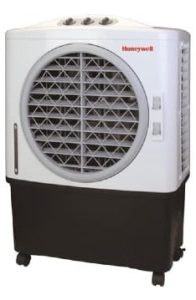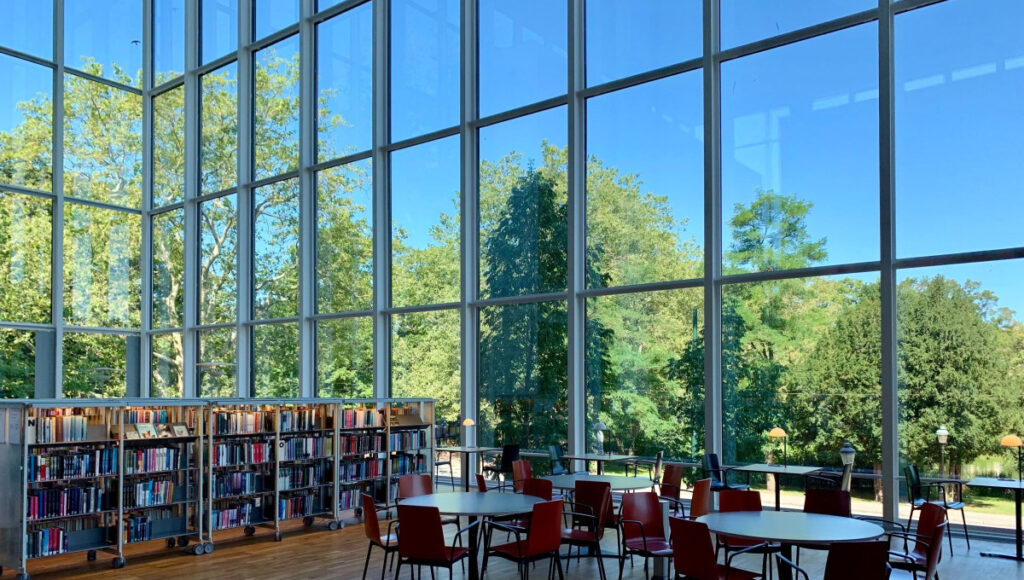Commercial Air Conditioning
Both powerful and quiet, modern commercial air conditioning units are a great, energy-efficient way of maintaining an optimum temperature all year round.

Contents

Click To Jump To Section
Commercial Air Conditioning Installation
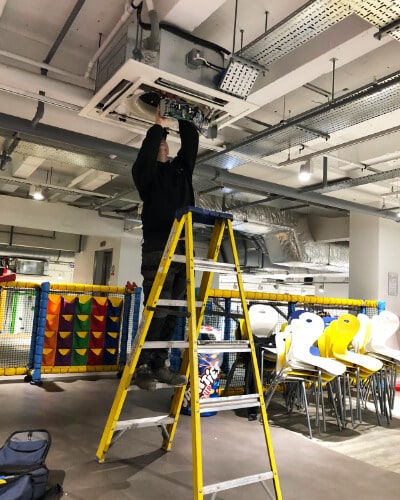
Discover the Perfect AC Solution for Your Business
Maintaining a comfortable temperature is crucial for any business. Our modern commercial air conditioning units are both powerful and quiet, ensuring optimal year-round climate control.
Download our brochure to discover:
- Energy-efficient solutions to keep your costs down.
- A wide range of units to suit any size or type of business.
- The benefits of regular maintenance for peak performance.
Commercial Aircon by Midland Air Conditioning
- Durable
- Cost effective
- Energy efficient
- Discreet
Our quick and easy air conditioning price calculator will help you select an aircon system that will best suit the needs of your business.
- Individual Louvre Control
- Extended pipe runs of up to 100m
- New slim design optimised for small ceiling voids
- Available with hard wired control as standard
- 24 Hour On/Off timer
- Auto restart functionality
- Auto flap mode functionality
- Available with wireless remote as standard
- Extended pipe runs of up to 100m
- Slim height design of 210mm or 250mm
- Available with hard wired control as standard
- Top, right or rear piping available, for added installation flexibility
- External static pressure control function
- Extended pipe runs of up to 100m
- Pre-fit lift pump
- Available with hard wired control as standard
Commercial Servicing and Maintenance
- Single and multi-room systems
- VRV and VRF systems
- Fresh air and extraction units
The MAC Maintenance Plan
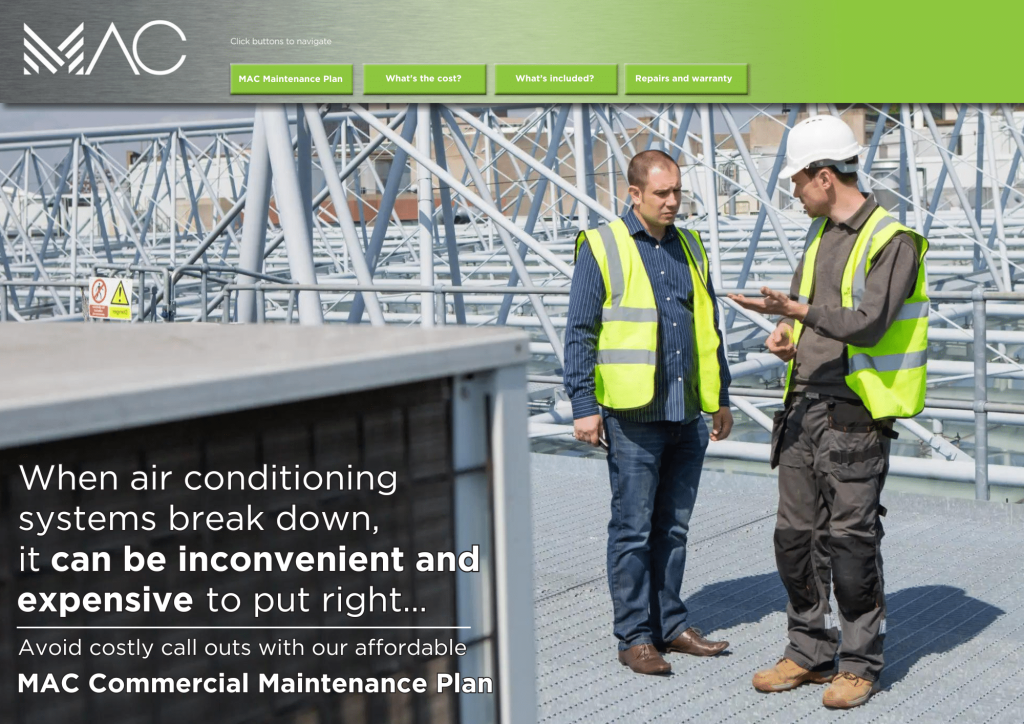
It’s essential your business can go about its daily operations without interruption and if your heating or cooling systems fail, it can lead to significant disruption. With regular professional maintenance, your commercial AC system will remain extremely cost-effective and reliable throughout its entire lifespan.
To help you get the most out of your commercial air conditioning systems, we recommend our maintenance plan which will cover all your annual servicing to keep your system in the best possible shape.
When you opt into our plan, you merely need to provide an upfront annual payment, even if your commercial AC system wasn’t installed by us, you can still opt in at no extra cost. Just remember, if your air conditioning wasn’t installed by MAC, your warranty may vary.
The Maintenance Process and Method
- Complete pressure and performance checks.
- Check and clean all filters and evaporator coils.
- Comprehensive leak test.
- Inspection of all insulation, pipework, trunking and wiring.
- Issue a detailed service report for your records.
Commercial Air Conditioning Repair

Emergency Callouts
A faulty air system can be a very serious problem, not only presenting a disruption to your business but a risk to Health and Safety as well. It’s crucial you call us as soon as possible if you suspect you have a problem, regardless of whether your AC system was fitted by us or by another party.
Our fully qualified repair engineers can repair a variety of commercial air conditioning systems that include;
- VRV and VRF systems
- Split and multi-split systems
- Air purifiers and extraction units
FIND OUT MORE ABOUT OUR COMMERCIAL REPAIR SERVICES

Commercial Air Conditioning
Looking for a short term air conditioning solution to keep your business cool?
Portable home and commercial air conditioning units are ideal for temporarily cooling during heatwaves or as a stand-in whilst your installed system is being repaired. Compact and convenient, portables offer a quick and easy solution; they even dehumidify and provide air purification too!
As a business, you also have the exclusive option to hire as well as purchase from a range of different options we have available.
- 3.5kw / 12,000btu/hr
- Cooling & Heating
- ‘A’ Rating
- 1.5M Exhaust Duct
- Hire Cost (weekly): £65 EX VAT
- 24 Hour On/Off timer
- Auto restart functionality
- Auto flap mode functionality
- Available with wireless remote as standard
- Suitable Cooling Area: 57m2
- Fan Speeds: 3
- ‘Water Tank Capacity: 48 Litres
- Weight (Empty): 13kg
- Hire Cost (weekly): £65 EX VAT
- 3.5kw / 12,000btu/hr
- Cooling & Heating
- ‘A’ Rating
- Hire Cost (weekly): £65 EX VAT
- Suitable Cooling Area: 80m2 Fan Speeds: 3
- ‘Water Tank Capacity: 60 Litres
- Weight (Empty): 18kg
- Hire Cost (weekly): £65 EX VAT
Other Commercial Services We Provide
Office air conditioning isn’t just for the summer. It provides a constant, energy-efficient stream of heat all year round, in addition to dehumidifying and purifying your air.
MAC can provide (AC) air conditioning units for schools, colleges and universities to provide cooling in the warm and muggy summer months and heat during.
Keep your guests both comfortable and happy by installing our top-of-the-range hotel air conditioning systems – for heating, cooling and ventilation capable.
MAC offers a range of units utilising heat pump technology specifically designed for commercial working environments, so we can ensure they offer unparalleled…
What Our Customers Say
Client Testimonials


Jessica Wheeler
PRINCIPAL. ELMHURST BALLET SCHOOL (IN ASSOCIATION WITH BIRMINGHAM ROYAL BALLET)

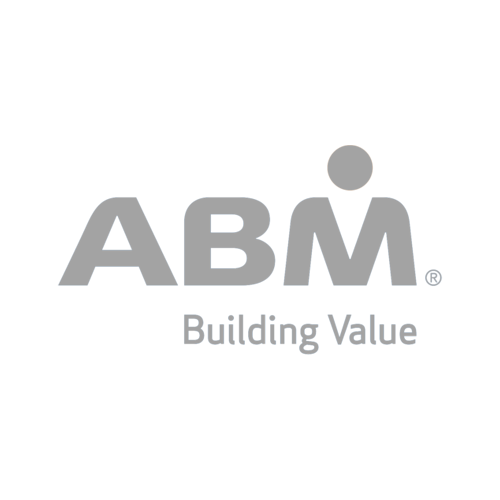
Matthew McCoy
FACILITIES MANAGER, ABM. BIRMINGHAM’S BULLRING & GRAND CENTRAL.
MAC has been our preferred supply-chain partner for all air conditioning across both complexes for over 8 years. We require exceptionally high standards and MAC has never delivered anything less.
Reliability is key. MAC ensures our air-conditioning systems are well maintained and keeps costs down for our many tenants; the team is always at the end of the phone if I need them and they deliver a great customer experience that’s both professional and highly competitive.
Commercial Air Conditioning FAQs
Yes, you can and often should have air conditioning in a commercial kitchen. Here’s why:
Importance of Air Conditioning in Commercial Kitchens
- Comfort and Safety: Commercial kitchens get incredibly hot due to cooking equipment. Air conditioning keeps the environment comfortable, preventing heat exhaustion and safety risks for staff.
- Food Hygiene: High temperatures encourage bacterial growth. Air conditioning helps maintain proper food storage temperatures and prevents spoilage.
- Air Quality: Cooking produces grease, smoke, and odors. Air conditioning, combined with proper ventilation, removes these contaminants, improving air quality for staff and customers.
- Equipment Efficiency: Many commercial kitchen appliances function optimally within specific temperature ranges. Air conditioning helps prevent equipment malfunction and breakdowns.
- Legal Requirements: In some jurisdictions, regulations may require adequate ventilation and temperature control in commercial kitchens.
- Split Systems: These offer flexibility with separate indoor and outdoor components, allowing targeted cooling in specific kitchen areas.
- Ducted Systems: Distribute cooled air throughout the entire kitchen space via a network of ducts.
- Supplementary Cooling: Utilise smaller units like box split air conditioners for additional cooling in the hottest sections of the kitchen.
Important Considerations
- Professional Installation: Commercial kitchen air conditioning requires specialised design and installation to ensure it doesn’t interfere with ventilation systems.
- Energy Efficiency: Choose energy-efficient systems to minimise running costs.
- Regular Maintenance: Maintain filters and the system properly to ensure its performance and longevity.
The need for planning permission for commercial air conditioning in the UK depends on several factors, including:
- Size of the System: Smaller air conditioning systems generally fall within permitted development rights, meaning you don’t need planning permission. However, larger, more complex systems may require permission.
- Type of Building: Listed buildings or those in conservation areas may have stricter regulations regarding external installations, including air conditioning units.
- Location of External Units: The placement of external units must adhere to certain guidelines. Units should be at least one meter away from property boundaries and a similar distance from the edge of flat roofs. They cannot be installed on pitched roofs.
- Noise Levels: The external unit’s noise level should not cause disturbances to neighbour’s.
Here’s a breakdown of the costs involved in commercial air conditioning, aiming to provide as much insight as possible:
Factors Influencing Cost
The cost of commercial air conditioning varies greatly depending on:
- Size of the Space: Larger spaces require more powerful systems and extensive installation, increasing costs.
Type of System:
- Split systems are more affordable for smaller areas.
- Ducted systems offer whole-building coverage but are more expensive.
- VRF/VRV systems are flexible and suitable for large spaces but come with the highest price tag.
- Brand and Energy Efficiency Higher-efficiency systems save money over time but have a higher initial cost. Well-known brands may also be more expensive.
- Complexity of Installation: Labor costs can vary depending on the ease of access, ductwork required, and any structural modifications needed.
- Additional Features: Smart controls, advanced filtration, etc., will increase the price.
Approximate Cost Ranges (For More Information please use our Commercial Air Conditioning Calculator)
As a general guide, consider these rough estimates:
- Small Commercial Space (up to 500 sq ft): £2,000 – £5,000
- Medium Commercial Space (500 – 2000 sq ft): £5,000 – £15,000
- Large Commercial Space (above 2000 sq ft): £15,000+
The Refrigeration Cycle: The Heart of Cooling
Commercial air conditioning works on the same fundamental principle as a refrigerator, using a refrigeration cycle to extract heat from the air:
- Evaporation: A liquid refrigerant passes through an evaporator coil. Warm air from the building is blown over this coil, causing the refrigerant to evaporate and absorb heat from the air.
- Compression: The gaseous refrigerant is compressed, increasing its temperature and pressure.
- Condensation: The hot, high-pressure refrigerant travels to a condenser coil. Outside air is blown over the condenser, releasing the heat from the refrigerant, causing it to condense back into a liquid.
- Expansion: The liquid refrigerant passes through an expansion valve, reducing its pressure and temperature, ready to start the cycle again.




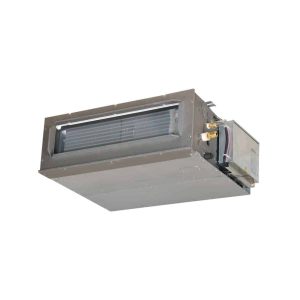
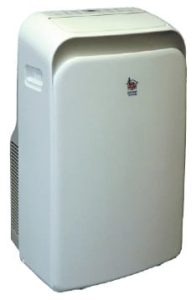
![[1:52 PM] Romany Lynch Carrier vented portable air conditioning unit. Model 51QPD 1200BTU (3.5KW)](https://www.midlandaircon.co.uk/wp-content/uploads/2024/04/51QPD-219x300.jpg)
